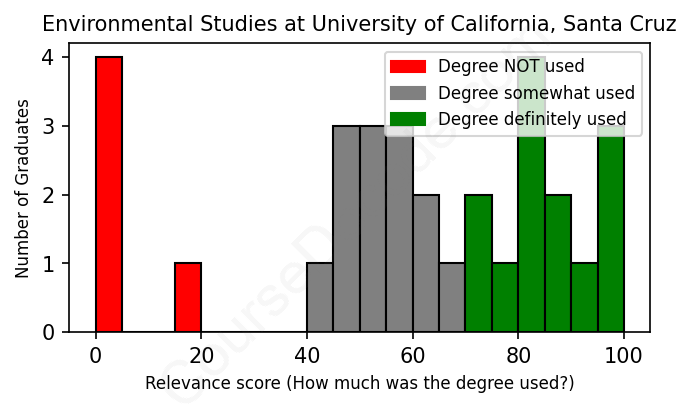
First, some facts. Of the Environmental Studies graduates from University of California, Santa Cruz we've analyzed , here's how many have used (or NOT used) their degree in their career:

These are estimates based on AI analysis of 31 LinkedIn profiles (see below).
The verdict? Below average. Overall, with an average relevance score of 59%, Environmental Studies graduates from University of California, Santa Cruz have a lower likelihood (-8%) of finding work in this field compared to the average graduate across all fields:
And for comparison, here's the chart for all profiles we've looked at across all degrees.
Also, after graduating, only 12% of these graduates have pursued further education other than another Bachelor's degree (such as a Masters degree or other), compared to the average across all profiles of 35%. This suggests a Bachelors degree is enough for most Environmental Studies graduates, and it's normal to look for work straight after graduation.
See the details:
|
Relevance score: 65% We think this person has gone into a career only somewhat relevant to their degree. We think this person has gone into a career only somewhat relevant to their degree.
DEGREE INFOGraduated in 2012 from University of California, Santa Cruz with a Bachelor of Arts (B.A.) in Environmental Studies. No other secondary education since. JOB HISTORY SINCE GRADUATIONBotanist U.S. Forest Service May 2014 - Aug 2014 Consulting Utility Forester  Western ECI Mar 2016 - Aug 2017 Volunteer Coordinator  EvergreenHealth Oct 2020 - Present ABOUTNo information provided. |
The top 10 most common jobs done by the graduates we've analyzed (ranked most common to least) are:
When looking at the jobs held by people who graduated in Environmental Studies from the University of California, Santa Cruz, it’s clear that many of them have taken roles that are closely tied to environmental practices and principles. Positions like Americorps Watershed Steward Project Member, Ecology Action program specialists, and various roles at the California Department of Fish and Wildlife showcase a strong connection to environmental studies, focusing on conservation, recovery efforts, and public health. Roles in the environmental education sector, such as an Environmental Education Intern or positions with community organizations, also highlight a commitment to advocating for ecological awareness and sustainability. Interestingly, more technical positions involving GIS, environmental policy, and scientific analysis are also prominent, indicating that graduates are applying their scientific skills across various facets of the field.
However, there are numerous instances where individuals have ended up in roles that are less relevant to their degree. Jobs in food service, retail, or administrative support do not utilize the specialized knowledge of environmental studies. While those experiences can be valuable, they do dilute the overall picture of how this degree translates into a career trajectory directly linked to environmental work. It’s a mixed bag, with many graduates managing to find fulfilling roles that embrace their studies, while others may need to take detours into unrelated fields to gain work experience. Overall, though many jobs are relevant, the breadth of outcomes demonstrates the varied paths graduates can take post-college, some more aligned with environmental goals than others.
Here is a visual representation of the most common words in job titles for Environmental Studies graduates (this is across all Environmental Studies graduates we've analyzed, not just those who went to University of California, Santa Cruz):

The career trajectories of graduates from the University of California, Santa Cruz with a degree in Environmental Studies showcase a mixed bag of outcomes. Right after graduating, many of these individuals tend to start off with positions that align reasonably well with their major, such as internships and entry-level jobs in environmental organizations, conservation, and community engagement roles. You can see that AmeriCorps positions, internships in environmental agencies, and roles like project managers in ecology-related projects are common first jobs. A lot of them often embrace opportunities that involve hands-on environmental work, educational programming, and community outreach, which is honestly a solid starting point for a career in this field.
However, if you look a bit longer down the line—about 5 to 10 years into their careers—the story starts to widen. Some folks stick with the environmental field and find success, landing roles like research scientists, program managers, and environmental planners. Others, though, seem to veer off the direct environmental path, taking jobs that are only tangentially related or entirely unrelated to their studies, like accounting, bartending, or sales. So, while there are plenty of graduates actively contributing to environmental causes and policy, there are also quite a few who might not be using their degree in the way they initially envisioned. Overall, it seems like a good number of people are having meaningful careers in environmental fields, but with a mix of those who have taken different routes over time.
Getting a Bachelor’s degree in Environmental Studies at UC Santa Cruz can be a bit of a mixed bag. On one hand, you’re diving into some really interesting and relevant topics, and the campus vibes are super supportive, especially since so many students are passionate about sustainability and the environment. However, it does require a good amount of hard work, especially with research projects, fieldwork, and understanding complex environmental systems. It might feel a bit harder than some other majors because of the breadth of knowledge you need to cover—from science to policy to social issues. So, while it’s not the most brutal degree out there, it definitely keeps you on your toes and requires dedication!
Most commonly, in the LinkedIn profiles we've looked at, it takes people 4 years to finish a Bachelor degree in Environmental Studies.
Looking at the job paths for these UC Santa Cruz Environmental Studies grads, it seems like their earnings could be all over the map. Some have dabbled in roles that likely don't pay much, like working at AmeriCorps or as a bartender, especially in those early years, which can be more about gaining experience than a fat paycheck. However, as they’ve moved on, you can see some solid career growth, particularly for those who landed positions at places like the California Department of Fish and Wildlife or as Agricultural Project Managers where the pay is likely a lot better. Overall, if they're sticking with the environmental field, the money might not be sky-high compared to other industries, but there's potential for decent salaries as they gain experience and move into management or specialized roles.
Here is a visual representation of the most common words seen in the "about" section of LinkedIn profiles who have a Bachelor degree in Environmental Studies (this is across all Environmental Studies graduates we've analyzed, not just those who went to University of California, Santa Cruz). This may or may not be useful:

Here are all colleges offering a Bachelor degree in Environmental Studies (ordered by the average relevance score of their Environmental Studies graduates, best to worst) where we have analyzed at least 10 of their graduates:
| College | Score | Count |
|---|---|---|
 California State University-Sacramento California State University-Sacramento
|
89 | 10 |
 University of Vermont University of Vermont
|
72 | 21 |
 University of California, Santa Barbara University of California, Santa Barbara
|
69 | 24 |
 University of California, Santa Cruz University of California, Santa Cruz
|
59 | 31 |
 Florida State University Florida State University
|
57 | 10 |
 University of Washington University of Washington
|
57 | 13 |
 UC Santa Barbara UC Santa Barbara
|
57 | 15 |
 University of Oregon University of Oregon
|
56 | 13 |
 University of Colorado Boulder University of Colorado Boulder
|
53 | 24 |